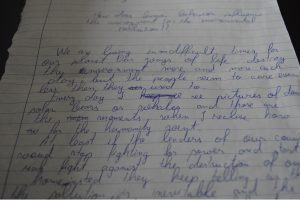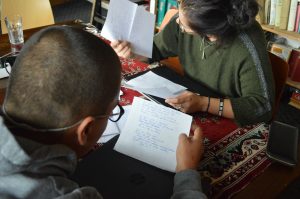My reflection about the competition of essays
Since the end of January I have been in Romania within the framework of an EVS in the organisation Curba de Cultura. And thus also in a project called BYSC-E, in which there are two more volunteers, with whom I also share a house.
Now about 8 months have passed and we have organized many different projects and events.
The basic idea of the project is to teach children and young people about environmental issues. But apart from imparting knowledge, it is also (and above all) about rising awareness towards topics such as recycling, environmental pollution and one’s own ecological behaviour. The mediation takes place in schools and outside the schools.
In the course of time we have planned and carried out many “school lessons”. But our didactic plan differs from that of the school. We focus on non-formal education and structure our lessons accordingly.
We go to schools and build bins with the young people in which they can separate the trash and we talk to the pupils about recycling and the responsibility of each individual. This usually takes place in the lower grades.
We try to convey knowledge in an interesting and appropriate way for the target group, through games or interactive design.
We also offer many activities outside the school. On World Environment Day, for example, we have organized an exhibition and a debate in our youth centre. We have invited young people to talk to them about their future in an increasingly globalised world and what opportunities each individual has to contribute to a more ecological world.
During the school holidays we organized a camp in which we dealt with four days of environmental topics. We did workshops with the children where they could try out how to make useful things out of trash. We also organized a hike with the children to pick up the trash in the forest.
Besides these activities, there were also activities for which each of us was individually responsible.
As described above, we go to schools to discuss environmental issues with the students. Besides lower grades we also went to high schools.
In this context I was responsible for a certain activity.

The idea was to organize a competition based on creative writing in the 12th grade. Of course thematically appropriate. So I thought about which topic could be interesting for the target group and how I could implement it. The topic was “How does human behavior influences the environment ( or the environmental pollution) ?”
I decided to leave it up to the students to choose which text form to use, so it could be an essay, a poem, a song or something like that. The idea was to give the students the plan so that each student could write something. One week after the writing I should go back to the same class to “award” the best text and go deeper in the topic.
So I went to school with this plan. I presented my idea to the students in the presence of the teacher and focused on the free choice of text. I think this was something new for the students. The focus, as mentioned above, is on non-formal education. I wanted the students to know that they could express themselves the way they wanted.
But (unfortunately) it went a bit different. While I was still explaining my plan, I was interrupted by the teacher who reminded the students how to structure an essay and remind them of the corresponding school lessons. She also told the students that they should substantiate their texts with many facts. I explained again that each student can express him- or herself as (s)he wishes. And that it will not evaluate with marks. So the students started writing and every student wrote something on his or her paper. I took the texts with me to read them. Contrary to my expectations, many students disregarded the teacher’s instructions and wrote very personal and poetic (regardless of a perfect structure) texts. Much to my delight.
The next week I went back to class to talk to the students about their texts. Unfortunately there was no real discussion and I decided to change the content of the lesson. I also decided not to award the best text.
Two things I learned during this activity or were a gain in knowledge for me:
1. I was very surprised by the content of the students’ texts. Most of the students drew a gloomy picture of the future in relation to the environment and seemed more or less helpless and powerless in their responsibility.
2. I and we propagate again and again a knowledge transfer based on non-formal education. Not only since our project, but for many years. I have found (and not only in this activity) that it is still new territory for teachers and that they find it difficult to implement or accept this form of education.
It’s no big surprise that some teachers have a hard time with these aspects. I think that the school system (not only in Romania!) is largely based on a clearly formal curriculum and this determines the everyday life and thinking of the teachers. So they are certainly very well educated in their field and know how to transport this knowledge in the way mentioned above.

Nevertheless, I and we try to implement other aspects of education, not only the mediation, but also the contents into the everyday school life.
Fortunately, we have cooperations with the schools in the area and can slowly but surely introduce a different kind of mediation. Not to replace the teachers, but to supplement them!
About the author